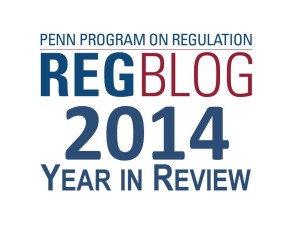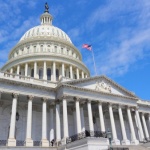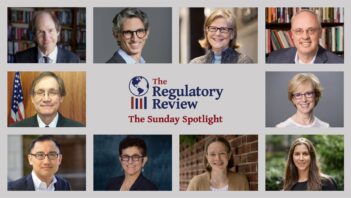
The Regulatory Review celebrates 2014 by featuring our top analysis posts from the past year.
 As the new year arrives, The Regulatory Review would like to reflect on the many important regulatory developments and debates that occurred in the United States and around the world throughout 2014. We also want to recognize some of the excellent work we had the privilege to feature on The Regulatory Review this past year. On these last three days of this year, we are presenting the top essays published in The Regulatory Review over the past twelve months, based on the number of page views for the work appearing in each of our opinion, news, and analysis sections.
As the new year arrives, The Regulatory Review would like to reflect on the many important regulatory developments and debates that occurred in the United States and around the world throughout 2014. We also want to recognize some of the excellent work we had the privilege to feature on The Regulatory Review this past year. On these last three days of this year, we are presenting the top essays published in The Regulatory Review over the past twelve months, based on the number of page views for the work appearing in each of our opinion, news, and analysis sections.
Today we feature, in alphabetical order by author, the top analysis stories from 2014. Visit our “Year in Review” series main page for information about the top news and opinion stories.
Wataru Aikawa (The Regulatory Review) | December 10
Cost-benefit analyses are important tools in improving the quality of regulation, but can be slow and cumbersome. A new working paper criticizes how agencies apply cost-benefit analysis and proposes a simpler, faster, and more effective way of conducting cost-benefit analyses, called a “back-of-the-envelope” analysis.
 The Growing Application of Cost-Benefit Analysis to Financial Regulation
The Growing Application of Cost-Benefit Analysis to Financial Regulation
Jessica Bassett (The Regulatory Review) | January 8
Is the enjoyment of an after-dinner coffee worth being kept awake at night and being tired the next day? When we answer that kind of question and many others like it, we evaluate the pros and cons of our choices. In effect, we do a cost-benefit analysis.
 House Subcommittee Airs Debate Over “Secret Law”
House Subcommittee Airs Debate Over “Secret Law”
Jessica Bassett (The Regulatory Review) | February 11
Debate over public access to all regulatory standards continued recently before a U.S. House of Representatives subcommittee. The debate centered on a practice called “incorporation by reference,” which some legislators say keeps binding laws hidden from the public.
 A Better Way to Study the Effects of Regulation on Employment
A Better Way to Study the Effects of Regulation on Employment
Jessica Bassett (The Regulatory Review) | March 17
In the wake of the Great Recession, recent political debates have focused on the impact regulation has on employment and economic recovery. But what actual impact does regulation have on the economy, and how can agencies account for employment in rulemaking?
 Climate Change is Getting Worse
Climate Change is Getting Worse
Lev Breydo (The Regulatory Review) | November 26
Evidence of global warming is “unequivocal,” according to a recently released report by the Intergovernmental Panel on Climate Change (IPCC). The IPCC also expressed “high confidence” that the current emissions trajectory will lead to “severe, pervasive and irreversible impacts for people and ecosystems” by 2100.
 A Libertarian Bias in the D.C. Circuit’s Administrative Law
A Libertarian Bias in the D.C. Circuit’s Administrative Law
Alexandra Hamilton (The Regulatory Review) | July 30
The United States’ court system has a clear hierarchy, and lower courts are obliged to follow the decisions of the Supreme Court. However, those lower courts sometimes step out of line and the Supreme Court must reassert its superior authority.
 Can Moneyball Make States Better Regulators?
Can Moneyball Make States Better Regulators?
James Hobbs (The Regulatory Review) | May 28
Before a federal agency can issue a new regulation, it must usually prove that the benefits of the proposal justify its costs. In theory, this process makes vast swaths of the American regulatory regime more legitimate, efficient, and effective.
 Supreme Court Regulatory Cases to Watch
Supreme Court Regulatory Cases to Watch
Brandon Kenney (The Regulatory Review) | October 16
A Facebook rapper, a bearded prisoner, and a red grouper fisherman will all figure into a highly anticipated Supreme Court term that includes several cases that may affect the American regulatory landscape.
 Do Regulators Listen to the Public?
Do Regulators Listen to the Public?
Brandon Kenney (The Regulatory Review) | June 24
Americans submit over one million comments each year on federal agencies’ proposed rules, but a new study suggests agencies mainly listen to industry insiders.
 The Unemployment Costs of Regulation
The Unemployment Costs of Regulation
Christian Latham (The Regulatory Review) | March 13
When regulators calculate the value of proposed regulations, they typically employ a cost-benefit analysis (CBA) that compares the net benefits of the rule with the compliance costs borne by the regulated industry. If the benefits outweigh the costs, the regulation is viable. New research, however, suggests that a simple CBA … may significantly underestimate the costs of some regulations.
 U.S. Agency Expands Support for Partial Decommissioning of Oil Rigs
U.S. Agency Expands Support for Partial Decommissioning of Oil Rigs
Marie Logan (The Regulatory Review) | January 30
More offshore oil rigs could be permitted to remain on the ocean floor after they retire, according to a new policy adopted by a little-known agency that regulates the offshore oil industry in the United States.
 Can Copyright Law Protect Revenge Porn Victims?
Can Copyright Law Protect Revenge Porn Victims?
Brandi Lupo (The Regulatory Review) | November 6
Although not a perfect solution, copyright law may provide a remedy for revenge porn victims, according to a recent paper by Amanda Levendowski…. Levendowski argues that “[w]orking backward from the remedy victims most want—takedown procedures—copyright law stands out as the most efficient and predictable way to achieve those goals.”
 Audit Says FEMA Still Not Ready to Deliver Supplies During Emergencies
Audit Says FEMA Still Not Ready to Deliver Supplies During Emergencies
Marika Mikuriya (The Regulatory Review) | December 1
FEMA, which received much criticism for its slow response to Hurricane Katrina, subsequently adopted a new logistics management system to improve its supply chain. Yet a recent report … suggests that this system, which has already cost $247 million, still might not be able to help disaster victims very well.
 Gift Cards and the Potential for Money Laundering
Gift Cards and the Potential for Money Laundering
Edgar Mkrtchian (The Regulatory Review) | April 10
If you’ve walked through your local supermarket or drugstore lately, you’ve probably seen a stand of gift-cards. Often regarded as the “most profitable” square foot in retail, gift cards are prized by retailers and have enjoyed “flourishing growth in the marketplace.”
 Behavioral Science in the Regulatory State
Behavioral Science in the Regulatory State
Natalie Punchak (The Regulatory Review) | January 27
President Obama’s Executive Order 13563 for the first time in history encouraged administrative agencies to draw upon the behavioral sciences in the design and implementation of new regulations. To date, however, agencies have received no practical guidance on how to integrate behaviorally inspired regulatory instruments into the regulatory process.
 Why Should Regulators Apply Cost-Benefit Analysis to Financial Regulation?
Why Should Regulators Apply Cost-Benefit Analysis to Financial Regulation?
Natalie Punchak (The Regulatory Review) | July 3
When the D.C. Circuit Court of Appeals struck down the SEC’s proxy access rule in 2011, it cited the agency’s failure to provide a rigorous cost-benefit analysis. Critics of that court decision argued that it created a burdensome new standard that would destroy the SEC’s ability to issue regulations.
 The Role of Distributional Impacts in Cost-Benefit Analysis
The Role of Distributional Impacts in Cost-Benefit Analysis
Natalie Punchak (The Regulatory Review) | April 24
Before issuing major environmental, health, and safety regulations, administrative agencies are required to assess their proposed rules’ costs and benefits in accordance with President Clinton’s Executive Order 12866.
 (Mis)management of Lake Okeechobee Discharges
(Mis)management of Lake Okeechobee Discharges
Christina Reichert (The Regulatory Review) | July 2
Florida’s Indian River Lagoon … plays a vital role in supporting an $840 million local economy that supports 27,000 jobs. Yet the lagoon and its more than 4,300 plant and animal species face serious danger. In addition to leakage from septic tanks and local runoff pollution, discharges of polluted fresh water from Lake Okeechobee plague the lagoon’s ecosystem.
 Should Chemical Regulation Be Stronger?
Should Chemical Regulation Be Stronger?
Christina Reichert (The Regulatory Review) | February 12
To strengthen or not to strengthen chemical regulation? That is the question on the minds of policymakers, advocates, and even ordinary citizens after the chemical spill in West Virginia.
 The Challenge of Keeping Hazardous Consumer Products Off the Market
The Challenge of Keeping Hazardous Consumer Products Off the Market
Kate Sell (The Regulatory Review) | November 24
According to a recent report by Congress’s independent watchdog agency, the U.S. Government Accountability Office (GAO), American consumers may face unwarranted risks of death or injury from some of the products they buy.
 Technology Companies or Taxi Services in Disguise?
Technology Companies or Taxi Services in Disguise?
Kate Sell (The Regulatory Review) | December 3
In an era where smartphone users can call up a list of every restaurant within walking distance or conduct bank transactions with a few taps on a screen, it was inevitable that ride-seekers would start to wonder: “Is there an app for cabs?”
 Cracks Emerge in U.S. Prohibition on Industrial Hemp Cultivation
Cracks Emerge in U.S. Prohibition on Industrial Hemp Cultivation
Jenna Shweitzer (The Regulatory Review) | March 4
Although many people are already aware that a number of states are legalizing marijuana for medicinal and even recreational use, fewer may know about recent federal and state law changes that loosen restrictions on industrial hemp production in the U.S.
 ConEd Invests $1 Billion in Infrastructure Resilient to Climate Change
ConEd Invests $1 Billion in Infrastructure Resilient to Climate Change
Jenna Shweitzer (The Regulatory Review) | March 25
In 2012, Hurricane Sandy caused thousands of New Yorkers to lose power, shutting down the city that never sleeps for days. Now Consolidated Edison, Inc., a major New York public utility that provides electrical services to over 11 million people, wants to take steps to prevent another major power outage.
 Improving Regulatory Processes Around the World
Improving Regulatory Processes Around the World
Daniel E. Walters (University of Pennsylvania Law School) | August 26
Regulation is a fixture of modern market economies around the world, but according to a new report by the international OECD, there remain many challenges and opportunities to improve the processes by which governments promulgate new regulations.
 What is the Future for Genetic Testing and Personalized Medicine?
What is the Future for Genetic Testing and Personalized Medicine?
Abena Yeboa (The Regulatory Review) | February 6
Personalized medicine, or the ability for the medical profession to tailor therapy to particular individuals’ genetic characteristics, has been a long desired but ever elusive goal for the life sciences. However, the prospects for personalized medicine appear to be improving in recent years.




